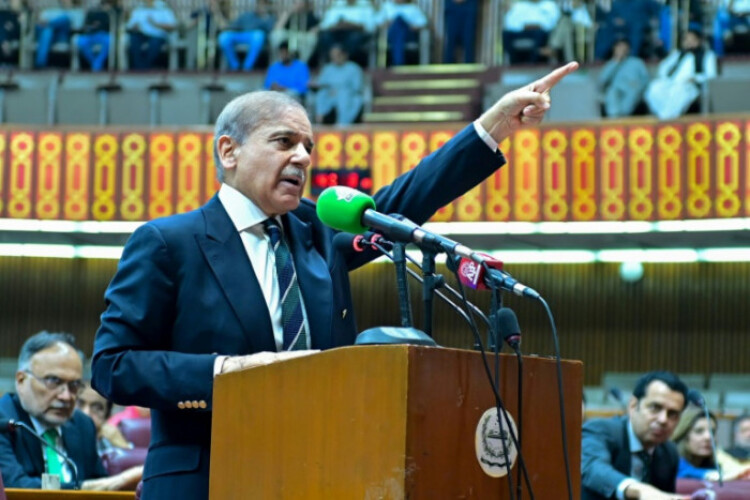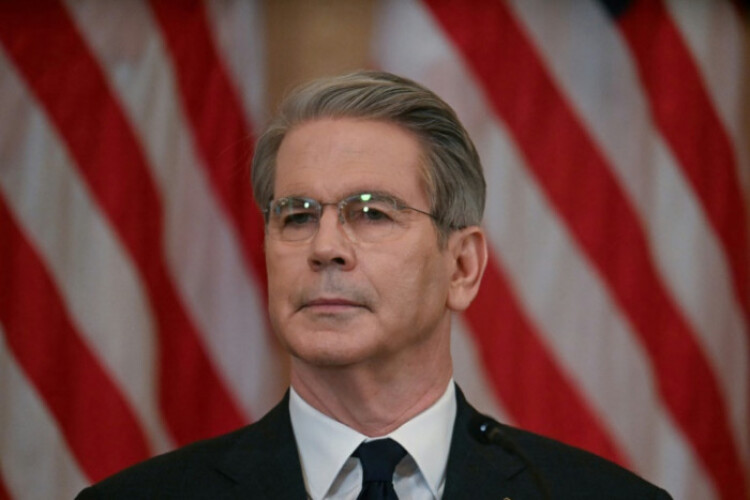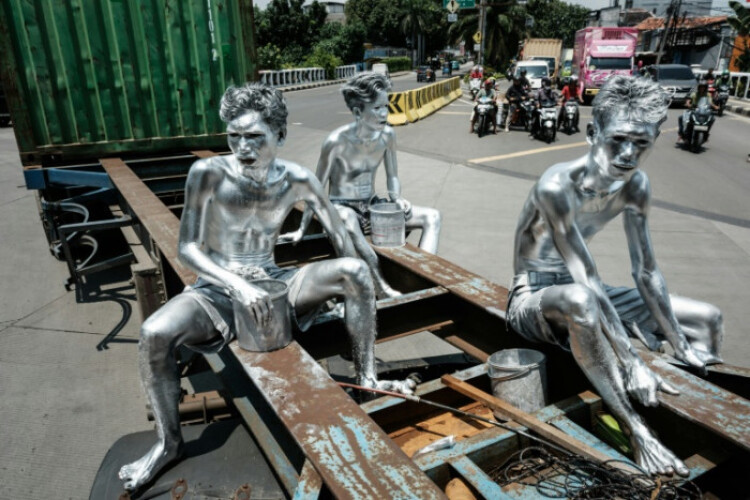
MUZAFFARABAD (PAKISTAN) - Pakistan has warned it will "avenge" those killed by Indian air strikes that New Delhi said were in response to an attack in Kashmir, signalling an imminent escalation in the worst violence in decades between the nuclear-armed neighbours.
At least 43 deaths have been reported so far, with Islamabad saying 31 civilians were killed by the Indian strikes and firing along the border, and New Delhi adding at least 12 dead from Pakistani shelling.
"We make this pledge, that we will avenge each drop of the blood of these martyrs," Pakistani Prime Minister Shehbaz Sharif said in an address to the nation late Wednesday.
India's army said it destroyed nine "terrorist camps" in Pakistan in the early hours of Wednesday, two weeks after New Delhi blamed Islamabad for backing an attack on tourists in the Indian-administered side of disputed Kashmir -- a charge Pakistan denies.
Pakistan military spokesman Ahmed Sharif Chaudhry said five Indian jets had been downed across the border.
An Indian senior security source, who asked not to be named, said three of its fighter jets had crashed on home territory.
The two sides have exchanged heavy artillery fire along the Line of Control that divides Kashmir, which both countries claim in full but administer separately.
The South Asian neighbours have fought two full-scale wars over the divided territory since they were carved out of the sub-continent after gaining independence from British rule in 1947.
"There were terrible sounds during the night, there was panic among everyone," said Muhammad Salman, who lives close to a mosque in Pakistan-administered Kashmir that was hit by an Indian strike.
"We are moving to a safer place... we are homeless now," added 24-year-old Tariq Mir, who was hit in the leg by shrapnel.
India said that its actions "have been focused, measured and non-escalatory".
Pakistan Defence Minister Khawaja Muhammad Asif accused Indian Prime Minister Narendra Modi of launching the strikes to "shore up" his domestic popularity, adding that Islamabad "won't take long to settle the score".
- 'People are fleeing' -
On Wednesday night, the Pakistani military spokesman said firing was "ongoing" at the Line of Control and that Islamabad would take retaliatory action against the air strikes.
Chaudhry reiterated Pakistan's "right to respond, in self-defence, at time, place, and manner of its choosing," adding that the armed forces had been "authorised" to do so by the government.
The largest Indian strike was on an Islamic seminary near the Punjab city of Bahawalpur, killing 13 people, according to the Pakistan military.
A government health and education complex in Muridke, 30 kilometres (20 miles) from Lahore, was blown apart, along with the mosque in Muzaffarabad -- the main city of Pakistan-administered Kashmir -- killing its caretaker.
Four children were among those killed in Wednesday's attacks, according to the Pakistan military.
Pakistan also said a hydropower plant in Kashmir was targeted by India, damaging a dam structure, after India threatened to stop the flow of water on its side of the border.
India's Defence Minister Rajnath Singh said the operation was New Delhi's "right to respond" following the attack on tourists in Pahalgam in Kashmir last month.
Pakistan has denied any involvement in that assault, which killed 26 people, mainly Hindu men, on April 22.
In Muzaffarabad, United Nations military observers arrived to inspect the mosque that Islamabad said was struck by India.
Residents collected damaged copies of the Koran from among concrete, wood, and iron debris.
In Indian-administered Kashmir, residents fled in panic from the Pakistani shelling.
"There was firing from Pakistan, which damaged the houses and injured many," said Wasim Ahmed, 29, from Salamabad village. "People are fleeing."
- Calls for restraint -
India had been widely expected to respond militarily to the Pahalgam attack, which it blamed on Pakistan-based group Lashkar-e-Taiba, a UN-designated terrorist organisation.
The two nations had traded days of threats and tit-for-tat diplomatic measures, and Pakistan conducted two missile tests.
The Indian army has reported nightly gunfire along the heavily militarised Line of Control since April 24.
Diplomats and world leaders have piled pressure on both countries to step back from the brink.
"The world cannot afford a military confrontation between India and Pakistan," the spokesman for UN chief Antonio Guterres said.
On Wednesday, US President Donald Trump called for a halt to the fighting, adding: "If I can do anything to help, I will be there."
Iranian Foreign Minister Abbas Araghchi was expected in New Delhi late on Wednesday, two days after a visit to Islamabad, as Tehran seeks to mediate.
Rebels in Indian-administered Kashmir have waged an insurgency since 1989, seeking independence or a merger with Pakistan.
India regularly blames Pakistan for backing armed groups fighting its forces in Kashmir, a charge that Islamabad denies.
burs-pjm-aha/sst
At least 43 deaths have been reported so far, with Islamabad saying 31 civilians were killed by the Indian strikes and firing along the border, and New Delhi adding at least 12 dead from Pakistani shelling.
"We make this pledge, that we will avenge each drop of the blood of these martyrs," Pakistani Prime Minister Shehbaz Sharif said in an address to the nation late Wednesday.
India's army said it destroyed nine "terrorist camps" in Pakistan in the early hours of Wednesday, two weeks after New Delhi blamed Islamabad for backing an attack on tourists in the Indian-administered side of disputed Kashmir -- a charge Pakistan denies.
Pakistan military spokesman Ahmed Sharif Chaudhry said five Indian jets had been downed across the border.
An Indian senior security source, who asked not to be named, said three of its fighter jets had crashed on home territory.
The two sides have exchanged heavy artillery fire along the Line of Control that divides Kashmir, which both countries claim in full but administer separately.
The South Asian neighbours have fought two full-scale wars over the divided territory since they were carved out of the sub-continent after gaining independence from British rule in 1947.
"There were terrible sounds during the night, there was panic among everyone," said Muhammad Salman, who lives close to a mosque in Pakistan-administered Kashmir that was hit by an Indian strike.
"We are moving to a safer place... we are homeless now," added 24-year-old Tariq Mir, who was hit in the leg by shrapnel.
India said that its actions "have been focused, measured and non-escalatory".
Pakistan Defence Minister Khawaja Muhammad Asif accused Indian Prime Minister Narendra Modi of launching the strikes to "shore up" his domestic popularity, adding that Islamabad "won't take long to settle the score".
- 'People are fleeing' -
On Wednesday night, the Pakistani military spokesman said firing was "ongoing" at the Line of Control and that Islamabad would take retaliatory action against the air strikes.
Chaudhry reiterated Pakistan's "right to respond, in self-defence, at time, place, and manner of its choosing," adding that the armed forces had been "authorised" to do so by the government.
The largest Indian strike was on an Islamic seminary near the Punjab city of Bahawalpur, killing 13 people, according to the Pakistan military.
A government health and education complex in Muridke, 30 kilometres (20 miles) from Lahore, was blown apart, along with the mosque in Muzaffarabad -- the main city of Pakistan-administered Kashmir -- killing its caretaker.
Four children were among those killed in Wednesday's attacks, according to the Pakistan military.
Pakistan also said a hydropower plant in Kashmir was targeted by India, damaging a dam structure, after India threatened to stop the flow of water on its side of the border.
India's Defence Minister Rajnath Singh said the operation was New Delhi's "right to respond" following the attack on tourists in Pahalgam in Kashmir last month.
Pakistan has denied any involvement in that assault, which killed 26 people, mainly Hindu men, on April 22.
In Muzaffarabad, United Nations military observers arrived to inspect the mosque that Islamabad said was struck by India.
Residents collected damaged copies of the Koran from among concrete, wood, and iron debris.
In Indian-administered Kashmir, residents fled in panic from the Pakistani shelling.
"There was firing from Pakistan, which damaged the houses and injured many," said Wasim Ahmed, 29, from Salamabad village. "People are fleeing."
- Calls for restraint -
India had been widely expected to respond militarily to the Pahalgam attack, which it blamed on Pakistan-based group Lashkar-e-Taiba, a UN-designated terrorist organisation.
The two nations had traded days of threats and tit-for-tat diplomatic measures, and Pakistan conducted two missile tests.
The Indian army has reported nightly gunfire along the heavily militarised Line of Control since April 24.
Diplomats and world leaders have piled pressure on both countries to step back from the brink.
"The world cannot afford a military confrontation between India and Pakistan," the spokesman for UN chief Antonio Guterres said.
On Wednesday, US President Donald Trump called for a halt to the fighting, adding: "If I can do anything to help, I will be there."
Iranian Foreign Minister Abbas Araghchi was expected in New Delhi late on Wednesday, two days after a visit to Islamabad, as Tehran seeks to mediate.
Rebels in Indian-administered Kashmir have waged an insurgency since 1989, seeking independence or a merger with Pakistan.
India regularly blames Pakistan for backing armed groups fighting its forces in Kashmir, a charge that Islamabad denies.
burs-pjm-aha/sst










